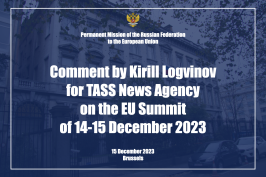Question: What conclusions can be drawn from the decision of the EU Summit to start accession negotiations with Ukraine and the failure of discussions on the allocation of financial assistance to Kiev?
Answer: The conclusion is quite simple – the EU has made an important step towards self-destruction. The decision to open negotiations with Ukraine and Moldova is politicised and, by and large, has nothing to do with the expansion of the trade and economic union that the EU once was in its purest form. Even among Western experts, there is not a single study that confirms the expediency of this decision with figures, or at least predicts the positive effects of Ukraine's accession to the EU. In other words, the very idea of enlargement has been definitively painted in geopolitical colours. The main task is "not to give Russia a gift" or "not to leave Kiev at the mercy of Moscow", regardless of the long-term economic costs for the EU and its Member States.
They ignored the voices of those who suggested that a strategic debate on building EU relations with Ukraine should precede discussing negotiations with the country. What seemed more important today was to "make history". And the Member States will witness its making: the opening of talks with Ukraine will make it possible to start the process of reforming the European Union, which will seriously limit their sovereignty and, in particular, deprive European capitals of their right of veto in the European Council.
Therefore, the decision on Ukraine, which is irrational for the European Union, has a fairly clear logic for the European Commission, which hopes to significantly expand Brussels' powers in this way.
This decision will have serious repercussions on political life within the European Union, including in the context of the forthcoming 2024 elections, in particular to the European Parliament. And then do not blame Russia for interfering in "democratic electoral processes": that will be used by the opponents of those who are currently in power in the Member States and who, despite all objections, authorised the start of accession talks with Ukraine.
The failure to approve a long-term financial aid to Ukraine of €50 billion over four years is quite natural, and not only because of the position of the Hungarian prime minister. In order to raise this money, the European Commission demanded that EU countries make additional contributions to the EU budget. But European capitals, taking advantage of the fact that they still have some sovereign powers, refused, or at least postponed this decision until next year – probably expecting to see how the US would behave in terms of helping Kiev.























